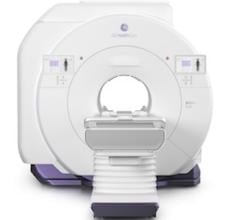November 15, 2010 — The Radiology journal released new data from an National Institutes of Health (NIH)-sponsored, multisite study of hundreds of women with newly diagnosed breast cancer that shows positron emission mammography (PEM) may reduce unnecessary breast biopsies. The study found PEM was significantly more precise at identifying benign and cancerous lesions, in what scientists call "positive predictive value" or "PPV," therefore reducing the number of unnecessary biopsies.
A common physician complaint regarding the use of breast magnetic resonance imaging (MRI) is its tendency to identify suspicious lesions, requiring biopsies which ultimately are found to be benign. This finding is a welcome outcome for women and physicians looking for ways to reduce the patient trauma associated with biopsies and for payors looking to reduce the costs associated with unnecessary procedures.
The 388-woman study showed that PEM not only demonstrated a six percent improvement in specificity at comparably high sensitivity, but also that PEM had 31 fewer unnecessary biopsies and 26 percent higher PPV than breast MRI. These results are also particularly significant for those women who cannot tolerate an MR exam and require an alternate imaging tool.
"The results of this study mean that not only do physicians have an additional, powerful tool to help treat breast cancer, but also that PEM is a legitimate and better alternative for the 16 percent of women who cannot tolerate MR due to claustrophobia, metallic implants, body habitus or gadolinium reaction," said Wendie Berg, M.D., Ph.D. and principal investigator for the trial.
PEM scanners are high-resolution breast positron emission tomography (PET) systems that can show the location as well as the metabolic phase of a lesion. This information is critical in determining whether a lesion is malignant and influences the course of treatment. Other imaging systems, such as mammography and ultrasound, show only the location, not the metabolic phase.
The NIH-sponsored multisite study (NIH grant 5R44CA103102) examined women with newly-diagnosed breast cancer. Patients were accrued from six leading clinical centers across the country: ARS Johns Hopkins Green Spring, Boca Raton Community Hospital, Scripps Clinic-Scripps Green Hospital, University of North Carolina, University of Southern California Norris Cancer Center and Anne Arundel Medical Center.
For more information: www.naviscan.com


 February 20, 2026
February 20, 2026 









